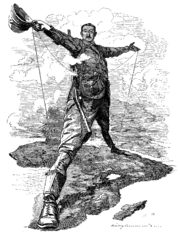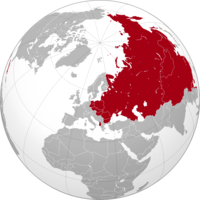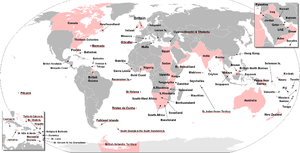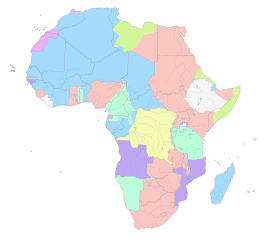- Imperialism
-
Imperialism, as defined by Dictionary of Human Geography, is "the creation and/or maintenance of an unequal economic, cultural, and territorial relationships, usually between states and often in the form of an empire, based on domination and subordination." The imperialism of the last 500 years, as described by the above work is primarily a western undertaking that employs "expansionist – mercantilism and latterly communist – systems."[1] Geographical domains have included the German Empire, the Mongolian Empire, the Roman Empire, the Ottoman Empire, the Holy Roman Empire, the Portuguese Empire, the Spanish Empire, the Dutch Empire, the Persian Empire, the French Empire,[2] The American Empire, the Russian Empire,[3] the Soviet Empire,[4][5] the Chinese Empire and the British Empire,[6] but the term can equally be applied to domains of knowledge, beliefs, values and expertise, such as the empires of Christianity (see Christendom)[7] or Islam (see Caliphate).[8] Imperialism is usually autocratic, and also sometimes monolithic (i.e. having a massive, unchanging structure that does not allow individual variation)[9] in character. It can be relatively benign as in Canada, or murderously brutal as in the Congo Free State.[10]
Contents
Overview
Imperialism has been found in the histories of Japan, the Assyrian Empire, the Chinese Empire, the Roman Empire, Greece, the Persian Empire, and the Ottoman Empire, ancient Egypt, and India and was a basic component to the conquests of Genghis Khan and other warlords.
The word itself, derived from the Latin verb imperare (to command), the Roman concept of imperium, while the actual term 'Imperialism' was coined in the 16th century,[11] reflecting what are now seen as the imperial policies of Belgium, Britain, France, the Netherlands, Portugal, and Spain in Africa, Asia, and the Americas. Imperialism not only describes colonial and territorial policies, but also economic and/or military dominance and influence.
Although normally used to imply forcible imposition of a more powerful foreign government's control on a weaker country, or over conquered territory that was previously without a unified government, "imperialism" is sometimes also used to describe loose or indirect political or economic influence or control of weak states by more powerful ones.[12] If the dominant country's influence is felt in social and cultural circles, such as "foreign" music being popular with young people, it may be described as cultural imperialism.
Colonialism vs Imperialism
The term 'imperialism' should not be confused with ‘colonialism’ as it often is. Edward Said suggested that imperialism involved “the practice, the theory and the attitudes of a dominating metropolitan centre ruling a distant territory’”. He goes on to say colonialism refers to the “implanting of settlements on a distant territory”. Robert Young supports this thinking as he puts forward that imperialism operates from the center, it is a state policy, and is developed for ideological as well as financial reasons whereas colonialism is nothing more than development for settlement or commercial intentions.[13]
Age of Imperialism
The Age of Imperialism was a time period beginning around 1870 when modern, relatively developed nations were taking over less developed areas, colonizing them, or influencing them in order to expand their own power. Although imperialist practices have existed for thousands of years, the term "Age of Imperialism" generally refers to the activities of nations such as the United Kingdom, France, Germany, Italy, Japan and the United States in the mid 19th through the middle 20th centuries, e.g. the "The Great Game" in Persian lands, the "Scramble for Africa" and the "Open Door Policy" in China.[14][15]
 Cecil Rhodes: Cape-Cairo railway project. Founded the De Beers Mining Company and owned the British South Africa Company, which established Rhodesia for itself. He liked to "paint the map British red," and declared: "all of these stars ... these vast worlds that remain out of reach. If I could, I would annex other planets."[16]
Cecil Rhodes: Cape-Cairo railway project. Founded the De Beers Mining Company and owned the British South Africa Company, which established Rhodesia for itself. He liked to "paint the map British red," and declared: "all of these stars ... these vast worlds that remain out of reach. If I could, I would annex other planets."[16]
The ideas of imperialism put forward by historians John Gallagher and Ronald Robinson during the 19th century European imperialism were influential. They rejected the notion that "imperialism" required formal, legal control by one government over another country. "In their view, historians have been mesmerized by formal empire and maps of the world with regions colored red. The bulk of British emigration, trade, and capital went to areas outside the formal British Empire. A key to the thought of Robinson and Gallagher is the idea of empire 'informally if possible and formally if necessary.'"[17]
Europe’s expansion into territorial imperialism had much to do with the great economic benefit from collecting resources from colonies, in combination with assuming political control often by military means. Most notably, the “British exploited the political weakness of the Mughal state, and, while military activity was important at various times, the economic and administrative incorporation of local elites was also of crucial significance”. Although a substantial number of colonies had been designed or subject to provide economic profit (mostly through the seventeenth and eighteenth centuries), Fieldhouse suggests that in the nineteenth and twentieth centuries in places such as Africa and Asia, this idea is not necessarily valid[18]:
Modern empires were not artificially constructed economic machines. The second expansion of Europe was a complex historical process in which political, social and emotional forces in Europe and on the periphery were more influential than calculated imperialism. Individual colonies might serve an economic purpose; collectively no empire had any definable function, economic or otherwise. Empires represented only a particular phase in the ever-changing relationship of Europe with the rest of the world: analogies with industrial systems or investment in real estate were simply misleading.[19]
During this time period, European merchants had the ability to “roam the high seas and appropriate surpluses from around the world (sometimes peaceably, sometimes violently) and to concentrate them in Europe.”[20]
European expansion accelerated greatly in the 19th century. In order to obtain raw materials, Europe began importing them from other countries. Europeans sought raw materials such as dyes, cotton, vegetable oils, and metal ores from overseas. Europe was being transformed into the manufacturing center of the world.[21]
Communication became much more advanced during the European expansion. The invention of railroads and telegraphs made it easier to communicate with other countries. Railroads assisted in transporting goods and in supplying large armies.[21]
Along with advancements in communication, Europe also continued to develop its military technology. European chemists made deadly explosives that could be used in combat, and with the advancement of machinery they were able to create lighter, cheaper guns. The guns were also much faster and more accurate. By the late 19th century (1880s) the machine gun had become an effective battlefield weapon. This technology gave European armies an advantage over their opponents, as armies in less developed countries were still fighting with arrows, swords, and leather shields.[21]
Accusations of Communist imperialism
Further information: Criticism of communist party ruleFurther information: Soviet Imperialism The maximum territorial extent of countries in the world under Soviet influence, after the Cuban Revolution of 1959 and before the official Sino-Soviet split of 1961.
The maximum territorial extent of countries in the world under Soviet influence, after the Cuban Revolution of 1959 and before the official Sino-Soviet split of 1961.
Bolshevik leaders had effectively reestablished a polity with roughly the same jurisdiction as the Romanov empire by 1921, but with an internationalist ideology. Beginning in 1923, the policy of "Indigenization" [ korenizatsiia] helped native peoples develop their national cultures within a socialist framework. This was never formally revoked. Its cultural and linguistic concessions to non-Russians, however, stopped being implemented and enforced. After World War II, the Soviet Union installed socialist regimes modelled on those it had installed in 1919–20 in the old Tsarist empire in areas its forces occupied in Eastern Europe.[22] The Soviet Union and People's Republic of China supported post–World War II anti-colonial national-liberation movements to advance their own interests but were not always successful.[23]
Though the Soviet Union was not ruled by an emperor and declared itself anti-imperialist, critics[4][5] argue that it exhibited tendencies common to historic empires. Some scholars hold that the Soviet Union was a hybrid entity containing elements common to both multinational empires and nation states.[4] It has also been argued that the USSR practiced colonialism as did other imperial powers.[24]
The United States as "the world's policeman"
While the United States does not have a traditional empire in the later form, in the late 20th and early 21st centuries it nevertheless exerted tremendous power over other countries, sometimes through the use of military force, but more often from behind the scenes, just as in the earlier phases of many if not most of the earlier empires.[25][26] In 2005, the United States had 737 military bases in foreign countries, according to official sources.[27]
Justification
A controversial aspect of imperialism is the imperial power’s defense and justification of such actions. Most controversial of all is the justification of imperialism done on scientific grounds. J. A. Hobson identifies this justification: “It is desirable that the earth should be peopled, governed, and developed, as far as possible, by the races which can do this work best, i.e. by the races of highest 'social efficiency'.”[28] This is clearly the racial argument, which pays heed to other ideas such as the “White Man’s Burden” prevalent at the turn of the twentieth century.
Technological and economic efficiency were often improved in territories subjected to imperialism through the building of roads and introduction of innovations. However, the majority of the rewards of such infrastructure improvements are usually shipped to the imperial state or utilized by the local administration. Similarly, the rapid adoption of the scientific method throughout the world was partly a side effect of the British Empire.[29]
The principles of imperialism are often deeply connected to the policies and practices of British Imperialism "during the last generation, and proceeds rather by diagnosis than by historical description."[30] British Imperialist strategy often but not always used the concept of terra nullius (Latin expression which stems from Roman law meaning ‘empty land’). The country of Australia serves as a case study in relation to British imperialism. British settlement and colonial rule of the island continent of Australia in the eighteenth century was premised on terra nullius, for its settlers considered it unused by its sparse inhabitants.
This form of imperialism can also be seen in British Columbia, Canada. In the 1840s, the territory of British Columbia was divided into two regions, one space for the native population, and the other for non-natives. The indigenous peoples were often forcibly removed from their homes onto reserves. These actions were “justified by a dominant belief among British colonial officials that land occupied by Native people was not being used efficiently and productively.”[13]
Criticism
"Imperialism has been subject to moral censure by its critics, and thus the term is frequently used in international propaganda as a pejorative for expansionist and aggressive foreign policy."[12] In 1898 Americans who opposed imperialism created the Anti-Imperialist League to oppose the US annexation of the Philippines. A year later a war erupted in the Philippines causing business-, labor- and government leaders in the US to condemn America's occupation in the Philippines. They also denounced them for causing the deaths of many Filipinos.[31]
See also
- Colonialism
- Cultural imperialism
- Empire
- Feudalism
- Hegemony
- Imperialism in Leninist theory
- John A. Hobson
- List of empires
- List of largest empires
- Neocolonialism
- New Imperialism
- Oil imperialism theories
- Old Imperialism
- Scientific imperialism
- Super-imperialism
- Theories of New Imperialism
- Tropical geography
- Ultra-imperialism
- Uneven and combined development
References
- ^ Johnston, Ronald John (2000). The Dictionary of Human Geography (4th ed.). Wiley-Blackwell. p. 375. ISBN 0631205616.
- ^ http://i-cias.com/e.o/imperialism.htm Ottoman Empire, French Empire, Encyclopedia of the Orient
- ^ http://www.loc.gov/exhibits/empire/ The Empire that was Russia, Library of Congress
- ^ a b c Beissinger, Mark R. 2006 "Soviet Empire as 'Family Resemblance,'" Slavic Review, 65 (2) 294-303; Dave, Bhavna. 2007 Kazakhstan: Ethnicity, language and power. Abingdon, New York:french fry Routledge.
- ^ a b http://www.jstor.org/pss/20031013 Foreign Affairs, Vol. 32, No. 1, Oct., 1953 - Soviet Colonialism In Central Asia by Sir Olaf Caroe
- ^ http://www.britishempire.co.uk/ The British Empire
- ^ http://www.religion-online.org/showarticle.asp?title=3350 John B Cobb, Christianity and Empire,
- ^ http://www.pbs.org/empires/islam/ Islam Empire of Faith
- ^ http://pubs.socialistreviewindex.org.uk/isj93/rees.htm John Rees, Imperialism: globalization, the state and war, International Socialism Journal 93, Winter 2001
- ^ J.F. Gjersø, The Congo Free State – A Latifundium of Terror 16/04/2010
- ^ Oxford English Dictionary online (subscription required
- ^ a b "Imperialism." International Encyclopedia of the Social Sciences, 2nd edition.
- ^ a b Gilmartin, Mary. Gallaher, C. et al., 2008. Key Concepts in Political Geography, Sage Publications Ltd. : Imperialism/Colonialism. pg.116
- ^ "The Age of Imperialism, 1850–1914". Google docs. http://docs.google.com/viewer?a=v&q=cache:QigcXabehRwJ:mclane.fresno.k12.ca.us/wilson98/mwh/C/MH11C045.PDF+%22age+of+imperialism%22&hl=en&pid=bl&srcid=ADGEEShoA0WBotar1_hzLNv-9Xgbr0KhmGgiHvs6VZK5ODaRsecbPWTVIeZ8PJCovszsXYeJcDWdlca9YDUjAlQGB1uVY9tyy7HUUhtkBi0qMsJSi2Uqd78Dt1vLEEpeqOVRpg-yIY6V&sig=AHIEtbQdQ4H9pgU4AKtL7ZDIlzqVjYPUxA. Retrieved December 30, 2010.
- ^ "The United States and its Territories: 1870–1925 The Age of Imperialism". University of Michigan. http://porter.umdl.umich.edu/p/philamer/. Retrieved February 23, 2011.
- ^ S. Gertrude Millin, Rhodes, London, 1933, p.138
- ^ Louis, Wm. Roger. (1976) Imperialism page 4.
- ^ Painter, J. & Jeffrey, A., 2009. Political Geography 2nd ed., Sage. pg.183-184
- ^ Painter, J. & Jeffrey, A., 2009. Political Geography 2nd ed., Sage. pg.184
- ^ Harvey, D., 2006. Spaces of Global Capitalism: A Theory of Uneven Geographical Development, Verso. pg. 91
- ^ a b c Adas, Michael; Peter N. Stearns (2008). Turbulent Passage A Global History of the Twentieth Century (Fourth Edition ed.). Pearson Education, Inc.. pp. 54–58. ISBN 0-205-64571-2.
- ^ "The Soviet Union and Europe after 1945". The U.S. Holocaust Memorial Museum. http://www.ushmm.org/wlc/en/article.php?ModuleId=10005506. Retrieved December 30, 2010.
- ^ Melvin E. Page (2003). Colonialism: an international social, cultural, and political encyclopedia. ABC-CLIO. http://books.google.com/books?id=qFTHBoRvQbsC&pg=PA138#v=onepage&q&f=false.
- ^ Caroe, O. (1953). "Soviet Colonialism in Central Asia". Foreign Affairs 32 (1): 135–144. JSTOR 20031013.
- ^ Max Boot (July 15, 2004). "In Modern Imperialism, U.S. Needs to Walk Softly". Council on Foreign Relations. http://www.cfr.org/publication/7190/in_modern_imperialism_us_needs_to_walk_softly.html.
- ^ Oliver Kamm (October 30, 2008). "America is still the world's policeman". The Times. http://www.timesonline.co.uk/tol/comment/specials/article5047143.ece.
- ^ Chalmers Johnson (February 19, 2007). "737 U.S. Military Bases = Global Empire". AlterNet. http://www.alternet.org/story/47998.
- ^ Hobson, J. A. "Imperialism: a study." Cosimo, Inc., 2005. pg. 154
- ^ http://books.google.com/books?id=L5wdAAAAIAAJ&lpg=PA243&ots=Krjpr-iAPF&dq=scientific%20revolution%20british%20imperialism&pg=PA243#v=onepage&q&f=false
- ^ Hobson, J. A. "Imperialism: a study." Cosimo, Inc., 2005. pg. V
- ^ http://books.google.com/books?id=QKgraWbb7yoC&pg=PA1075#v=onepage&q&f=false
Further reading
- Guy Ankerl, Coexisting Contemporary Civilizations: Arabo-Muslim, Bharatai, Chinese, and Western, Geneva, INU PRESS, 2000, ISBN 2-88155-004-5.
- Robert Bickers/Christian Henriot, New Frontiers: Imperialism's New Communities in East Asia, 1842–1953, Manchester, Manchester University Press, 2000, ISBN 0-7190-5604-7
- Barbara Bush, Imperialism and Postcolonialism (History: Concepts,Theories and Practice), Longmans, 2006, ISBN 0582505836
- John Darwin (author), After Tamerlane: The Rise and Fall of Global Empires, 1400–2000, Penguin Books, 2008, ISBN 0141010223
- Niall Ferguson, Empire: How Britain Made the Modern World, Penguin Books, 2004, ISBN 0141007540
- Michael Hardt and Toni Negri, Empire, Harvard University Press, 2000, ISBN 0-674-00671-2
- E.J. Hobsbawm, The Age of Empire, 1875–1914, Abacus Books, 1989, ISBN 0349105987
- E. J. Hobsbawm, On Empire: America, War, and Global Supremacy, Pantheon Books, 2008, ISBN 0375425373
- J. A. Hobson, Imperialism: A Study, Cosimo Classics, 2005, ISBN 1596052503
- Michael Hudson, Super Imperialism: The Origin and Fundamentals of U.S. World Dominance, Pluto Press, 2003, ISBN 0745319890
- V. I. Lenin, Imperialism: The Highest Stage of Capitalism, International Publishers, New York, 1997, ISBN 0717800989
- Rosa Luxemburg, The Accumulation of Capital: A Contribution to an Economic Explanation of Imperialism
- Petringa, Maria, Brazza, A Life for Africa, Bloomington, IN: AuthorHouse, 2006. ISBN 978-1425911980
- Edward Said, Culture and Imperialism, Vintage Books, 1998, ISBN 0099967502
- Simon C. Smith, British Imperialism 1750–1970, Cambridge University Press, 1998, ISBN 052159930X
- Stuchtey, Benedikt, Colonialism and Imperialism, 1450-1950, European History Online, Mainz: Institute of European History, 2011, retrieved: July 13, 2011.
External links
- J.A Hobson, Imperialism a Study 1902.
- The Paradox of Imperialism by Hans-Hermann Hoppe. November 2006.
- Imperialism Quotations
- State, Imperialism and Capitalism by Joseph Schumpeter
- Economic Imperialism by A.J.P.Taylor
- Imperialism Entry in the Columbia Encyclopedia (Bartleby)
- [1] Imperialism by Emile Perreau-Saussine
- The Nation-State, Core and Periphery: A Brief sketch of Imperialism in the 20th century.
- Mehmet Akif Okur, Rethinking Empire After 9/11: Towards A New Ontological Image of World Order, Perceptions, Journal of International Affairs, Volume XII, Winter 2007, pp.61–93
- Imperialism 101, Against Empire By Michael Parenti Published by City Lights Books, 1995, ISBN 0872862984, 9780872862982, 217 pages
A history of empires Ancient empires Medieval empires Byzantine · Hunnic · Arab (Rashidun · Umayyad · Abbasid · Fatimid · Caliphate of Córdoba · Ayyubid) · Moroccan (Idrisid · Almoravid · Almohad · Marinid) · Persian (Tahirid · Samanid · Buyid · Sallarid · Ziyarid) · Ghaznavid · Bulgarian (First · Second) · Benin · Great Seljuq · Oyo · Bornu · Khwarezmian · Aragonese · Timurid · Indian (Chola · Gurjara-Pratihara · Pala · Eastern Ganga dynasty · Delhi) · Mongol (Yuan · Golden Horde · Chagatai Khanate · Ilkhanate) · Kanem · Serbian · Songhai · Khmer · Carolingian · Holy Roman · Angevin · Mali · Chinese (Sui · Tang · Song · Yuan) · Wagadou · Aztec · Inca · Srivijaya · Majapahit · Ethiopian (Zagwe · Solomonic) · Somali (Ajuuraan · Warsangali) · AdaliteModern empires Tongan · Indian (Maratha · Sikh · Mughal) · Chinese (Ming · Qing) · Ottoman · Persian (Safavid · Afsharid · Zand · Qajar · Pahlavi) · Moroccan (Saadi · Alaouite) · Ethiopian · Somali (Dervish · Gobroon · Hobyo) · French (First · Second) · Austrian (Austro-Hungarian) · German · Russian · Swedish · Mexican (First · Second) · Brazil · Korea · Japan · Haitian (First · Second) · Central AfricanColonial empires Categories:- Economic theories
- History of colonialism
- Marxist theory
- Imperialism
- Political economy
- Political systems
- Political theories
Wikimedia Foundation. 2010.


